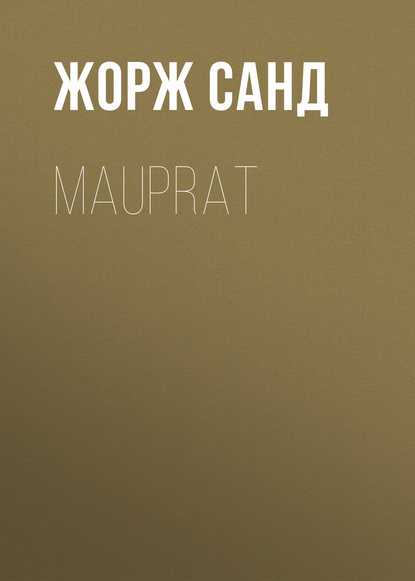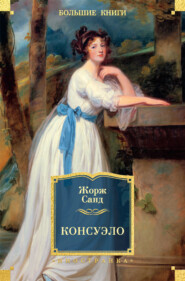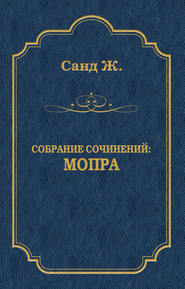По всем вопросам обращайтесь на: info@litportal.ru
(©) 2003-2024.
✖
Mauprat
Настройки чтения
Размер шрифта
Высота строк
Поля
Marcasse came and knelt down beside me; two streams of tears were running down his withered, sallow cheeks. On his face, usually so impassive, there was an ineffable expression of pity and sorrow and affection.
“Poor master!” he said, “delirium, head bad, that’s all. Great misfortune! But fidelity not changed. Always with you; if need be, ready to die with you.”
His tears and words filled me with sadness; but this was owing to an instinctive sympathy enhanced by the weak state of my nerves, for I did not remember a thing. I threw myself into his arms and wept like himself; he pressed me to his bosom, as a father might his son. I was fully conscious that some frightful misfortune had overtaken me, but I was afraid to learn what it was, and nothing in the world would have induced me to ask him.
He took me by the arm and led me through the forest. I let myself be taken like a child. Then a fresh sense of weariness came over me, and he was obliged to let me sit down again for half an hour. At last he lifted me up and succeeded in leading me to Roche-Mauprat, where we arrived very late. I do not know what happened to me during the night. Marcasse told me subsequently that I had been very delirious. He took upon himself to send to the nearest village for a barber, who bled me early in the morning, and a few minutes later I recovered my reason.
But what a frightful service they seemed to have done me. Dead! Dead! Dead! This was the only word I could utter. I did nothing but groan and toss about on my bed. I wanted to get up and run to Sainte-Severe. My poor sergeant would throw himself at my feet, or plant himself in front of the door to prevent me. To keep me back, he would tell me various things which I did not in the least understand. However, his manifest solicitude for me and my own feeling of exhaustion made me yield, though I could not explain his conduct. In one of these struggles my vein opened again, and I returned to bed before Marcasse noticed it. Gradually I sank into a deep swoon, and I was almost dead when, seeing my blue lips and purple cheeks, he took it into his head to lift up the bed-clothes, and found me lying in a pool of blood.
However, this was the most fortunate thing that could have happened to me. For several days I remained in a state of prostration in which there was but little difference between my waking and sleeping hours. Thanks to this, I understood nothing, and therefore did not suffer.
One morning, having managed to make me take a little nourishment, and noticing that with my strength my melancholy and anxiety were returning, Marcasse announced, with a simple, genuine delight, that Edmee was not dead, and that they did not despair of saving her. These words fell upon me like a thunderbolt; for I was still under the impression that this frightful adventure was a delusion of my delirium. I began to shout and to brandish my arms in a terrible manner. Marcasse fell on his knees by my bed and implored me to be calm, and a score of times he repeated the following words, which to me were like the meaningless words one hears in dreams:
“You did not do it on purpose; I know well enough. No, you did not do it on purpose. It was an accident; a gun going off in your hand by chance.”
“Come, now, what do you mean?” I exclaimed impatiently. “What gun? What accident? What have I to do with it?”
“Don’t you know, then, sir, how she was hit?”
I passed my hands over my brow as if to bring back to my mind the energy of life, and as I had no clear recollection of the mysterious event which had unhinged it, I thought that I was mad, and remained silent and dismayed, fearful lest any word should escape to betray the loss of my faculties.
At last, little by little, I collected my thoughts. I asked for some wine, as I felt weak; and no sooner had I drunk a few drops than all the scenes of the fatal day unrolled themselves before me as if by magic. I even remembered the words that I had heard Patience utter immediately after the event. It was as if they had been graven in that part of the memory which preserves the sound of words, even when the other part which treasures up their sense is asleep. For one more moment I was uncertain; I wondered if my gun could have gone off in my hands just as I was leaving Edmee. I distinctly remembered firing it at a pewit an hour before, for Edmee had wanted to examine the bird’s plumage. Further, when I heard the shot which had hit her, my gun was in my hands, and I had not thrown it down until a few seconds later, so it could not have been this weapon which had gone off on falling. Besides, even granting a fatality which was incredible, I was much too far from Edmee at that moment to have shot her. Finally, I had not a single bullet on me throughout the day; and it was impossible for my gun to have been loaded, unknown to myself, since I had not unslung it after killing the pewit.
Quite convinced, therefore, that I was not the cause of the hideous accident, it remained to me to find an explanation of this crushing catastrophe. To me it was perfectly simple; some booby with a gun, I thought, must have caught sight of Edmee’s horse through the branches and mistaken it for a wild beast; and I did not dream of accusing any one of a deliberate attempt at murder. I discovered, however, that I was accused myself. I drew the truth from Marcasse. He informed me that the chevalier and all the people who took part in the hunt had attributed the misfortune to a pure accident, their opinion being that, to my great sorrow, my gun had gone off when my horse threw me, for it was believed that I had been thrown. This was practically the view they all took. In the few words that Edmee had been able to utter she seemed to confirm the supposition. Only one person accused me, and that was Patience; but he had accused me before none but his two friends, Marcasse and the Abbe Aubert, and then only after pledging them to secrecy.
“There is no need,” added Marcasse, “for me to tell you that the abbe maintains an absolute silence, and refuses to believe that you are guilty. As for myself, I swear to you that I shall never – ”
“Stop! stop!” I said. “Do not tell me even that; it would imply that some one in the world might actually believe it. But Edmee said something extraordinary to Patience just as she was dying; for she is dead; it is useless for you to try to deceive me. She is dead, and I shall never see her again.”
“She is not dead!” cried Marcasse.
And his solemn oaths convinced me, for I knew that he would have tried in vain to lie; his simple soul would have risen in revolt against his charitable intentions. As for Edmee’s words, he frankly refused to repeat them; from which I gathered that their testimony seemed overwhelming. Thereupon I dragged myself out of bed, and stubbornly resisted all Marcasse’s efforts to keep me back; I had the farmer’s horse saddled and started off at a gallop. I staggered into the drawing-room without meeting any one except Saint-Jean, who uttered a cry of terror on seeing me, and rushed off without answering my questions.
The drawing-room was empty. Edmee’s embroidery frame, buried under the green cloth, which her hand, perchance, would never lift again, seemed to me like a bier under its pall. My uncle’s big arm-chair was no longer in the chimney-corner. My portrait, which I had had painted in Philadelphia and had sent over during the American war, had been taken down from the wall. These were signs of death and malediction.
I left this room with all haste and went upstairs with the courage of innocence, but with despair in my soul. I waled straight to Edmee’s room, knocked, and entered at once. Mademoiselle Leblanc was coming towards the door; she gave a loud scream and ran away, hiding her face in her hands as if she had seen a wild beast. Who, then, could have been spreading hideous reports about me? Had the abbe been disloyal enough to do so? I learnt later that Edmee, though generous and unshaken in her lucid moments, had openly accused me in her delirium.
I approached her bed and, half delirious myself, forgetting that my sudden appearance might be a deathblow to her, I pulled the curtains aside with an eager hand and gazed on her. Never have I seen more marvellous beauty. Her big dark eyes had grown half as large again; they were shining with an extraordinary brilliancy, though without any expression, like diamonds. Her drawn, colourless cheeks, and her lips, as white as her cheeks, gave her the appearance of a beautiful marble head. She looked at me fixedly, with as little emotion as if she had been looking at a picture or a piece of furniture; then, turning her face slightly towards the wall, she said, with a mysterious smile:
“This is the flower they call Edmea sylvestris.”
I fell upon my knees; I took her hand; I covered it with kisses; I broke into sobs. But she gave no heed; her hand remained in mine icy and still, like a piece of alabaster.
XXIII
The abbe came in and greeted me in a cold and sombre manner. Then he made a sign to me, and drawing me away from the bed, said:
“You must be mad! Return at once; and if you are wise, you will remain away. It is the only thing left for you to do.”
“And since when,” I cried, flying into a passion, “have you had the right to drive me out of the bosom of my family?”
“Alas! you have no longer a family,” he answered, with an accent of sorrow that somewhat disarmed me. “What were once father and daughter are now naught but two phantoms, whose souls are already dead and whose bodies soon will be. Show some respect for the last days of those who loved you.”
“And how can I show my respect and grief by quitting them?” I replied, quite crushed.
“On this point,” said the abbe, “I neither wish nor ought to say anything; for you know that your presence here is an act of rashness and a profanation. Go away. When they are no more (and the day cannot be far distant), if you have any claims to this house, you may return, and you will certainly not find me here to contest them or affirm them. Meanwhile, as I have no knowledge of these claims, I believe I may take upon myself to see that some respect is paid to the last hours of these two holy people.”
“Wretched man!” I said, “I do not know what prevents me from tearing you to pieces! What abominable impulse urges you to be everlastingly turning the dagger in my breast? Are you afraid that I may survive this blow? Cannot you see that three coffins will be taken out together from this house? do you imagine that I have come here for aught but a farewell look and a farewell blessing?”
“You might say a farewell pardon,” replied the abbe, in a bitter tone, and with a gesture of merciless condemnation.
“What I say is that you are mad!” I cried, “and that if you were not a priest, this hand of mine should crush the life out of you for daring to speak to me in this way.”
“I have but little fear of you, sir,” he rejoined. “To take my life would be doing me a great service; but I am sorry that your threats and anger should lend weight to the charges under which you lie. If I saw that you were moved to penitence, I would weep with you; but your assurance fills me with loathing. Hitherto, I had seen in you nothing worse than a raging lunatic; to-day I seem to see a scoundrel. Begone, sir!”
I fell into an arm-chair, choking with rage and anguish. For a moment I hoped that I was about to die. Edmee was dying by my side, and before me was a judge so firmly convinced of my guilt that his usual gentle, timid nature had become harsh and pitiless. The imminent loss of her I loved was hurrying me into a longing for death. Yet the horrible charge hanging over me began to rouse my energies. I did not believe that such an accusation could stand for a single instant against the voice of truth. I imagined that one word from me, one look, would be sufficient to make it fall to the ground; but I felt so dazed, so deeply wounded, that this means of defence was denied me. The more grievously the disgrace of such a suspicion weighed upon my mind, the more clearly I realized that it is almost impossible for a man to defend himself successfully when his only weapon is the pride of slandered innocence.
I sat there overwhelmed, unable to utter a word. It seemed as if a dome of lead were weighing on my skull. Suddenly the door opened and Mademoiselle Leblanc approached me stiffly; in a tone full of hatred she informed me that some one outside wished to speak to me. I went out mechanically, and found Patience waiting with his arms folded, in his most dignified attitude, and with an expression on his face which would have compelled both respect and fear if I had been guilty.
“Monsieur de Mauprat,” he said, “I must request you to grant me a private interview. Will you kindly follow me to my cottage?”
“Yes, I will,” I replied. “I am ready to endure any humiliation, if only I can learn what is wanted of me and why you are all pleased to insult the most unfortunate of men. Lead the way, Patience, and go quickly; I am eager to return here.”
Patience walked in front of me with an impassive air. When we arrived at his little dwelling, we found my poor sergeant, who had just arrived likewise. Not finding any horse on which he could follow me, and not wishing to quit me, he had come on foot, and so quickly that he was bathed in perspiration. Nevertheless, the moment he saw us he sprang up full of life from the bench on which he had thrown himself under the bower of vine-branches, and came to meet us.
“Patience!” he cried, in a dramatic style which would have made me smile had it been possible for me to display a glimmer of mirth at such a moment. “Old fool!.. Slanderer at your age?.. Fie, sir!.. Ruined by good fortune.. you are.. yes.”
Patience, impassive as ever, shrugged his shoulders and said to his friend:
“Marcasse, you do not know what you are saying. Go and rest awhile at the bottom of the orchard. This matter does not concern you. I want to speak to your master alone. I wish you to go,” he added, taking him by the arm; and there was a touch of authority in his manner to which the sergeant, in spite of his ticklish prided, yielded from instinct and habit.
As soon as we were alone Patience proceeded to the point; he began by a series of questions to which I resolved to submit, so that I might the more quickly obtain some light on the state of affairs around me.
“Will you kindly inform me, monsieur,” he said, “what you purpose doing now?”
“I purpose remaining with my family,” I answered, “as long as I have a family; and when this family is no more, what I shall do concerns no one.”
“But, sir,” replied Patience, “if you were told that you could not remain under the same roof with them without causing the death of one or the other, would you persist in staying?”
“If I were convinced that this was so,” I rejoined, “I would not appear in their presence. I would remain at their door and await the last day of their life, or the first day of their renewed health, and again implore a love I have not yet ceased to deserve.”
“Ah, we have come to this!” said Patience, with a smile of contempt. “I should not have believed it. However, I am very glad; it makes matters clearer.”
“What do you mean?” I cried. “Speak, you wretch! Explain yourself!”
“You are the only wretch here,” he answered coldly, at the same time sitting down on the one stool in the cottage, while I remained standing before him.
I wanted to draw an explanation from him, at all costs. I restrained my feelings; I even humbled myself so far as to say that I should be ready to accept advice, if he would consent to tell me the words that Edmee had uttered immediately after the event, and those which she had repeated in her hours of delirium.

















